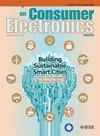A Lightweight Cloud-Edge Collaborative Intelligence Inference Framework With Runtime Dynamic Optimization for Resource-Constrained Consumer Electronics
IF 10.9
2区 计算机科学
Q1 ENGINEERING, ELECTRICAL & ELECTRONIC
引用次数: 0
Abstract
The proliferation of Internet of Things (IoT) and embedded computing has led to widespread deployment of smart consumer electronics requiring edge-based Artificial Intelligence (AI) capabilities. However, the heterogeneous nature of sensing data and dynamic edge environments poses significant challenges for efficient model inference on resource-constrained devices. To address these challenges, this paper presents a lightweight collaborative inference framework designed for consumer electronics. First, we formulate the inference optimization problem as a Mixed-Integer Nonlinear Programming (MINLP) problem, considering channel pruning, early exit and cloud offloading decisions to optimize the trade-off between accuracy and computational cost. Second, we propose a selective model activation mechanism based on Markov Decision Process (MDP), which employs a recursive self-attention mechanism to dynamically track inference budgets and guide decision-making through encoder-decoder architectures. The mechanism integrates entropy regularization during training to ensure robust and diverse execution paths. Comprehensive experiments demonstrate that our framework achieves 65.50% reduction in model parameters and 80.68% reduction in inference Floating Point Operations (FLOPs) while maintaining accuracy loss within 0.81% of the original model, making it suitable for real-time AI applications on resource-constrained consumer electronics.面向资源受限消费类电子产品的轻量级云边缘协同智能推理框架及运行时动态优化
物联网(IoT)和嵌入式计算的激增导致智能消费电子产品的广泛部署,这需要基于边缘的人工智能(AI)功能。然而,传感数据和动态边缘环境的异构性对资源受限设备上的有效模型推理提出了重大挑战。为了解决这些挑战,本文提出了一个为消费电子产品设计的轻量级协作推理框架。首先,我们将推理优化问题表述为一个混合整数非线性规划(MINLP)问题,考虑通道修剪、早期退出和云卸载决策,以优化精度和计算成本之间的权衡。其次,我们提出了一种基于马尔可夫决策过程(MDP)的选择性模型激活机制,该机制采用递归自关注机制动态跟踪推理预算,并通过编码器-解码器架构指导决策。该机制在训练过程中集成了熵正则化,以确保鲁棒性和多样化的执行路径。综合实验表明,我们的框架实现了模型参数减少65.50%,推理浮点运算(FLOPs)减少80.68%,同时将精度损失保持在原始模型的0.81%以内,适用于资源受限的消费电子产品的实时人工智能应用。
本文章由计算机程序翻译,如有差异,请以英文原文为准。
求助全文
约1分钟内获得全文
求助全文
来源期刊
CiteScore
7.70
自引率
9.30%
发文量
59
审稿时长
3.3 months
期刊介绍:
The main focus for the IEEE Transactions on Consumer Electronics is the engineering and research aspects of the theory, design, construction, manufacture or end use of mass market electronics, systems, software and services for consumers.

 求助内容:
求助内容: 应助结果提醒方式:
应助结果提醒方式:


